#class and crime
Explore tagged Tumblr posts
Text
"It is important from the outset to make some distinction between the State’s prison system, or police or military forces, and the individuals who serve in them, in describing them as purposeful violent institutions. It is probably fair to say that most men (and women, too, in this age of ‘equal rights’) who are recruited into one of these services are not doing so in order to be able to kill, or even to use violence. They are enticed by the financial benefits and promise of variety, adventure and education opportunities, and by the culturally encouraged image of ‘serving one’s country.’ That is how the State wants and needs it to be. It is not coincidental, either, of course, that those who do the front-line work — the real dirty work — in these professions are recruited predominantly from the lower socio-economic groups, where the lack of other educational, work and income opportunities make these enticements most salient and attractive. The fact that these people will be used by the State to carry out its wars against members of their own social groups at home and abroad is not part of their consciousness or service training. ...
While there are many differences between military training and the training received by police and prison guards, there are also many similarities (such as regular interforce shooting competitions), because all services must learn to automatically resort to violence under certain conditions.
Today we are witnessing a simultaneous build-up of military capability and threats, along with an expansion of the tools and use of internal repression. This is a result of the increasing material gap between the haves and have-nots, within societies and on an international level, even while the foundations of capitalism are disintegrating in the lace of growing competition for depleting resources and cheap labour, and increasing international political consciousness...
It is not surprising, then, in this climate of increasing social unrest, that prisons are being used more, new prisons are being built, and the violent and repressive measures that operate inside prisons are being extended. In Canada, a few examples are the construction of additional Special Handling Units (super-maximum segregation), installation of more and more draconian security equipment, searching and electronic surveillance of visitors, and increased power of the Parole Board to indefinitely delay (justifiable) release. The rising suicide rate in prisons is just one attestation to the increasing physical and psychological brutality (and futility) of imprisonment.
…
And who are prisons for? They are for those who learn only too well the meaning and power of ‘success’ in this society, and who dare to use the same tactics of intimidation, violence and lack of concern for others to achieve it as do the political and economic elite, but are without access to their legalised means... for those who can’t afford the cost of legal protection... for those who dare to be poor and who refuse to live gratefully and passively on meagre handouts... for those who are born into a social-economic position which deprives them of the education and skills necessary to earn an ‘honest’ living and who dare to use other means to seek escape from their demeaning poverty... for Native people, whose dignified way of life has been stripped away by the white man and replaced with the dehumanising and deadly life of alcohol... for women who refuse any longer to be subjected to routine beatings from a man and who dare to fight back... for women whose socialised and economic dependency on men, and their fear of them, draws them into criminal complicity... for those who, without the cover of domestic or legal protection, dare to act out the sexual violence towards women and children that is glorified in our culture every day... for those who refuse to learn to kill and be the cannon fodder for wars that are fought to protect the interests of the political and economic elite... for those whose political awareness dares them to challenge and defy the political and economic structures that provide the basis for nuclear weapons and all of the other essential, immoral and oppressive elements of militarism..."
- Helen Durie, unpublished paper, quoted at length by Claire Culhane, "Prisons: 1984 and After," in 1984 And After. Edited by Marsha Hewitt and Dimitros I. Roussopoulos. Montreal: Black Rose Books, 1984. p. 77-78
#purpose of incarceration#state violence#prison guards#class and crime#canadian criminal justice system#capitalist social relations#capitalism in canada#capitalism in crisis#anarchist analysis#anarchism in canada#war on crime#what the ruling class does when it rules#canadian prisons#research quote#reading 2025#history of crime and punishment in canada
15 notes
·
View notes
Text
Bruce: Parenthood is a spectrum.
Clark: Explain that.
Bruce: Sometimes, my kids make me so proud I almost like myself.
Bruce: Other times, I say ‘Well. At least they’re not doing crack cocaine’
#bruce wayne#dc#dc comics#batman#batdad#incorrect dc quotes#text post#one thing about Bruce is he’ll always enable his children through the power of delusion#YES jason DID seize the crime market and capitalized off drugs prostitution gun/weapon trafficking#but he was a pleasure to have in class
10K notes
·
View notes
Text
feel like we don't talk enough about the fact that shen qingqiu was fully prepared to die in the invasion of cang qiong to save his disciples, and not just in terms of without-a-cure. when he challenged sha hualing to a palm strike, he expected to die, his exact thoughts were "with this one strike, he'd ensure there were no winners", and he went in expecting his body to self destruct before liu qingge showed up.
it's such an important piece of characterization because shen yuan is often ranting in his head about "surviving at any cost" and "cheating his way out of it", but when he's actually faced with any kind of danger, his very first reaction is to protect the people around him with his life, without hesitation.
#i love shen yuan<3#shen yuan be like 'im so selfish i pick my own life over any other'#also shen yuan: oh youre in danger? i will be your human shield#jumps in front of binghe. jumps in front of his disciples. self detonates. puts himself in the water prison#had horrible sex to save the world#my dude i WISH you put yourself first for once#his worst crime is that he could be considered 'idle'#which is literally just him reading books on his peak and sleeping in between classes#its not that he skips classes because he DOES teach his disciples!! hes doing all of his work#but also reading and sleeping#which is like...... just a millennial Doing His Job#just AH again!! ppl considered shen yuan's worst traits to be that he slept read and ate treats#THATS IT#(in the extra the peak lords said that sqq seemed ''more idle'')#hes such a good guy sobsobsob#svsss#shen yuan#shen qingqiu#scum villain
2K notes
·
View notes
Text

A Palestinian journalist pays tribute to his little boy who was just murdered by 'Israel'.
#A Palestinian journalist pays tribute to his little boy who was just murdered by 'Israel'.#palestine#free palestine#freepalastine🇵🇸#abubaker#israel is a terrorist state#israel is committing genocide#israeli war crimes#israel is an apartheid state#israeli terrorism#israel#israhell#gaza strip#gaza genocide#free gaza#gazaunderattack#gaza#all eyes on rafah#save rafah#free rafah#rafah under attack#rafah#palestinian genocide#stop the genocide#genocide joe#genocide#class war#ausgov#politas#auspol
6K notes
·
View notes
Text

from my sibling
#😭#literally made me ijbol in class#they don’t even watch house 😭#house md#hilson#gregory house#james wilson#house#malpractice md#hate crimes md
973 notes
·
View notes
Text

all this blood is on the hands of everyone who decided to ‘stand with israel’ this week, knowingly or unknowingly, every single one of them
#war crime by definition but strangely not being denounced by any western governments who are so interested in calling for peace#does this look like peace to you??? is genocide your definition of peace???#you know anyone who paid attention in history class is recognising these signs#the feeling of helplessness is one that never goes away#it’s devastating#free palestine
5K notes
·
View notes
Text
Hot take, season 2 feels like piltover apologist propaganda
Piltover has been oppressing and exploiting zaun for who know how long, but the timeline where everything is good, all that had to be different was for hextech to not exist
at several points in the story, including Cait's poison gas mission, enforcers go down there to brutalise people in pursuit of jinx, but all of that unnecessary violence is brushed aside because there is a new Big Bad that we all must unite against. How convenient!
the Big Bad (Viktor) was from Zaun, and we need Piltover's police force to save us from this zaunite. Actually, the previous season's big bad was also from the undercity
zaunites come to help the people who treated them like animals their entire lives AND THEY PUT ON THE UNIFORMS OF PEOPLE WHO OPPRESSED THEM? I'M SORRY WHAT
Sevika who conveniently hasn't spoken a line since what, episode 4? her opinion isn't important, just be happy that she's on the council now.
entirety of act 3 actually
the "dirt under your nails" line. ????? Who wrote this? I want to talk.
#arcane spoilers#arcane s2 spoilers#arcane criticism#i wanted to like this season so badly#the class conflict was the frame of most of the story but when piltover's crimes pile too high there is a world ending threat and#suddenly human rights for poor people isn't an urgent matter anymore#because they're happy to side with their oppressors if they ask nicely#“you don't get it. they looked pensive and begrudging before they accepted” shut. shut.
422 notes
·
View notes
Text

poor mulder's not allowed SHIT in this household. hashtag justice for mulder hasthage trespassing isnt even a crime really if yuo think about it
#fun fact trespassing as a crime is grounded in institutions of racialized violence (specifically the atlantic slave trade amongst others)#it maintains the property of the ruling class and denies access to food sources/foraging#there's a whole big paper on it and i could talk about this forever#anyway. back to the original point#txf#my art#the x files#artists on tumblr#art#x files#fox mulder#walter skinner#david duchovny
1K notes
·
View notes
Text



Not my favorite stalker Keum Seong-je accidentally documenting a rare smile on Yeon Si-eun's face, followed by the perfect passport photo.
#weak hero class 2#whc2#yeon si eun#go hyun tak#park hu min#seo jun tae#bitchofdarkness gifs#kdramaedits#weak hero class 2 netflix#netflix drama#dude would be the perfect PI if he wasn't such a crime loving dipshit#Si-eun:'I swear Su-ho you're the first to make me smile'#Seong-je pulling up the evidence on his phone:'ACTUALLY!!!!!'
169 notes
·
View notes
Text
I see way too many fics where Caitlyn is cool. Arcane Caitlyn has a conspiracy board on her floor, no friends we see of her age despite being one of the richest people in Piltover, and sucks at making conversation. This is loser erasure and I will not stand for it. In this essay I will—
#look let's be real#arcane caitlyn would not be cool in a modern setting either#especially not a high school one#she would be listening to true crime podcasts and failing at flirting with girls okay#arcane#caitlyn kiramman#caitvi#i want a fic where she goes to vi for charisma lessons#i will allow caitlyn to be cool when she's being a class traitor but that's like it
3K notes
·
View notes
Text



#fantastic beasts#fb#fbawtft#fbtcog#fbtsod#fantastic beasts and where to find them#fantastic beasts the crimes of grindelwald#fantastic beasts the secrets of dumbledore#x-men#xmen#x-men first class#xmen first class#xmen 97#x-men 97#cherik#professor x#magneto#charles xavier#erik lehnsherr x charles xavier#erik lehnsherr#grindeldore#grindledore#gellert grindelwald#gellert x albus#albus dumbledore#albus percival wulfric brian dumbledore
293 notes
·
View notes
Text

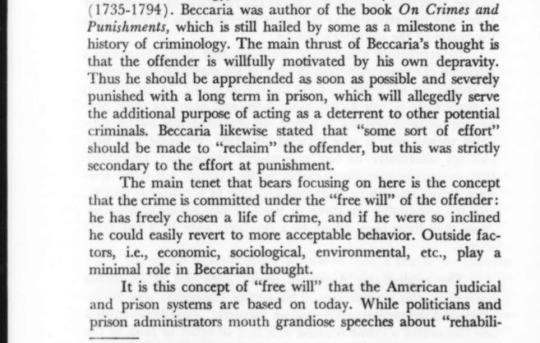

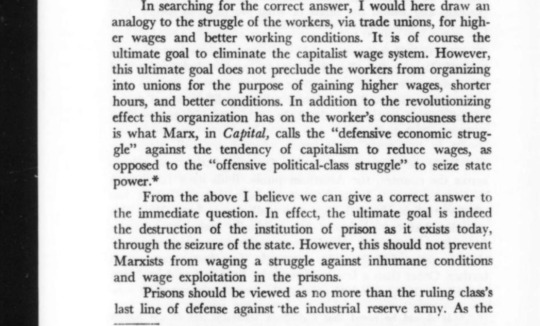
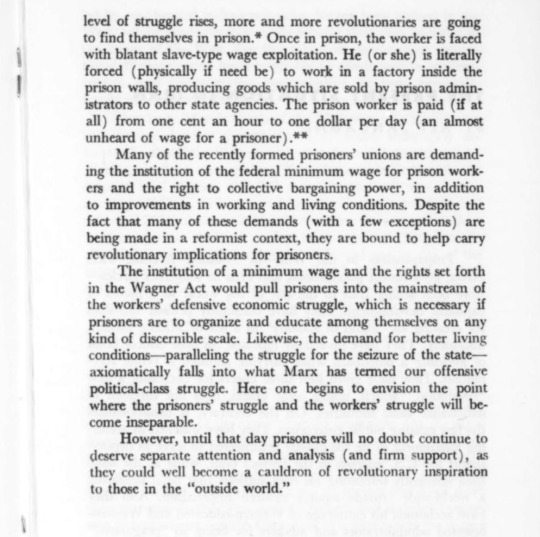
"A person can only be at odds with society for one of two reasons: either that society is sick (which ours most certainly is) or the individual is. Today, so-called modern penology is based on the false premise that it is solely the behavior of the offender that must be corrected, as if the cause for crime lies totally within the realm of the offender's psyche.
In combating this fallacy we must first bring to people's attention the realization that as long as we maintain our capitalist society we are going to have those who refuse, or are unable, to participate in this society gone mad, and many of these people are going to end up in prison. In replacing this insane capitalist society with a sane socialist structure, we must also provide an alternative to our present-day prison - an alternative that recognizes that the majority of its captives are those who were strong enough to resist participation in a mad-dog society, and the remainder are those in need of psychological help be-cause they have been driven to a psychotic state by a psychotic society.
...
Beccaria was author of the book On Crimes and Punishments, which is still hailed by some as a milestone in the history of criminology. The main thrust of Beccaria's thought is that the offender is willfully motivated by his own depravity. Thus he should be apprehended as soon as possible and severely punished with a long term in prison, which will allegedly serve the additional purpose of acting as a deterrent to other potential criminals. Beccaria likewise stated that "some sort of effort" should be made to "reclaim" the offender, but this was strictly secondary to the effort at punishment.
The main tenet that bears focusing on here is the concept that the crime is committed under the "free will" of the offender: he has freely chosen a life of crime, and if he were so inclined he could easily revert to more acceptable behavior. Outside factors, i.e., economic, sociological, environmental, etc., play a minimal role in Beccarian thought.
It is this concept of "free will" that the American judicial and prison systems are based on today. While politicians and prison administrators mouth grandiose speeches about "rehabilitation," in reality they structure prisons and formulate the criteria for release upon Beccarian principles. In California, as in most states, this is accomplished by the indeterminate sentence. Under this system a convicted person is given a sentence of, say, one year to 10, or perhaps 5 years to life. He (or she) then appears on a periodic basis in front of a parole board (made up in this case of ex-FBI agents, ex-police agents, etc.) who decide if the inmate is rehabilitated enough for release on parole.
Behind this facade of rehabilitation and objectivity is the 200-year-old Beccarian foundation. Proof of this can be found in the words of R. K. Procunier, Director of the California Department of Corrections:
We feel that the public's number one requirement of us is security. To keep the people sent us by the courts locked up; that's the real name of the game. Afterward, and as long as we have the offender on our hands, we do what we can to "improve" him, if possible, and within the limits of what we have to spend. This process. is known as rehabilitation.
Procunier's statement could easily be attributed to Beccaria himself. Despite the alleged deterrence and "rehabilitation" of this system, crime continues to be on the increase, prisons and jails continue to swell, and double-talking politicians and prison administrators continue to cloud the real issues with empty "law and order" rhetoric.
...
In searching for the correct answer, I would here draw an analogy to the struggle of the workers, via trade unions, for high-er wages and better working conditions. It is of course the ultimate goal to eliminate the capitalist wage system. However, this ultimate goal does not preclude the workers from organizing into unions for the purpose of gaining higher wages, shorter hours, and better conditions. In addition to the revolutionizing effect this organization has on the worker's consciousness there is what Marx, in Capital, calls the "defensive economic struggle" against the tendency of capitalism to reduce wages, as opposed to the "offensive political-class struggle" to seize state power.
From the above I believe we can give a correct answer to the immediate question. In effect, the ultimate goal is indeed the destruction of the institution of prison as it exists today, through the seizure of the state. However, this should not prevent Marxists from waging a struggle against inhumane conditions and wage exploitation in the prisons.
Prisons should be viewed as no more than the ruling class's last line of defense against the industrial reserve army. As the level of struggle rises, more and more revolutionaries are going to find themselves in prison. Once in prison, the worker is faced with blatant slave-type wage exploitation. He (or she) is literally forced (physically if need be) to work in a factory inside the prison walls, producing goods which are sold by prison administrators to other state agencies. The prison worker is paid (if at all) from one cent an hour to one dollar per day (an almost unheard of wage for a prisoner).
Many of the recently formed prisoners' unions are demanding the institution of the federal minimum wage for prison workers and the right to collective bargaining power, in addition to improvements in working and living conditions. Despite the fact that many of these demands (with a few exceptions) are being made in a reformist context, they are bound to help carry revolutionary implications for prisoners.
The institution of a minimum wage and the rights set forth in the Wagner Act would pull prisoners into the mainstream of the workers' defensive economic struggle, which is necessary if prisoners are to organize and educate among themselves on any kind of discernible scale. Likewise, the demand for better living conditions - paralleling the struggle for the seizure of the state - axiomatically falls into what Marx has termed our offensive political-class struggle. Here one begins to envision the point where the prisoners' struggle and the workers' struggle will become inseparable.
However, until that day prisoners will no doubt continue to deserve separate attention and analysis (and firm support), as they could well become a cauldron of revolutionary inspiration to those in the "outside world.""
- Terry L. Huston, a prisoner serving time at San Quentin, "Prisons: A Marxist Position," Monthly Review. Volume 25, no. 6, 1973: 29-30, 32-33.
#san quentin prison#abolitionism#prison abolition#marxism#marxist theory#american prison system#revolutionary struggle#prisoner demands#prisoner resistance#american capitalism#history of crime and punishment#words from the inside#capitalism and crime#class and crime
2 notes
·
View notes
Note
I agree with classist Alfred but I am always a believer in him hating Steph the most. Like when Tim was pissed at Bruce for telling Steph his identity Alfred was defending him with “oh you know he’s bad at communicating, and he takes secret identities very seriously yadda yadda yadda.” But in the Same Issue he tells Steph he blames her for upsetting Tim by being told his identity by Bruce (which I can’t state enough how little it was her fault, like she did try to find his identity in the past, but this was an entirely unrelated event where Bruce just straight up came up to her and told her) and he thinks it was a bad idea for Bruce to add her to the team.
I think for Alfred Steph and Jason are on the same level in the sense they're the lowest class out of all the bat children as such they both deserve the least respect especially compared to Tim who is himself from an upper class background
#cakercanart#ask#also a couple people have mentioned how unintentional this all is#like the writers didn’t know this stuff when theyre writing alfred#and i mentioned it myself in the tags of that post#but i would also like to note#just bc something is unintentional doesn’t dissolve it of it's crimes if you get what i mean#especially as alfred does more to uphold these ideas then he does to dissuade them in canon#like the writers may not know what theyre doing but theyre still doing it#maybe do some research and stop writing alfred like he hates everyone from the working class#or dont bc like i said numerous times#i think this is the best way to write him bc he should suck#a butler ex mi5 and ex military man who chose to leave his family should be portrayed as a shitty guy#unless you want to change his whole backstory#you should just let him suck
98 notes
·
View notes
Text
X-Men movies in nutshell:
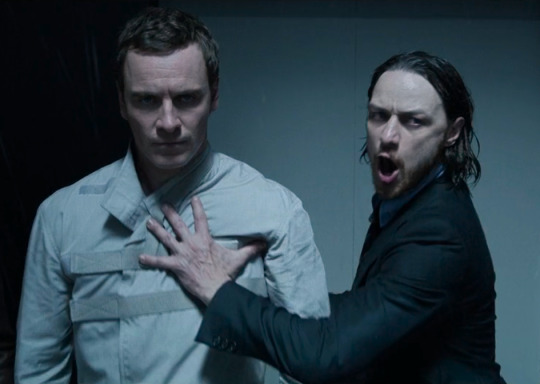
#aka#Erik committing war crimes and Charles trying to stop him#“ERIK NO”#“Erik yes”#charles xavier#erik lehnsherr#cherik#erik lehnsherr x charles xavier#x men#xmen days of future past#x men movies#xmen first class
369 notes
·
View notes
Text

Hello my fellow hatecrimes md fans i have a gift
#malpractice md#house md#hate crimes md#hilson#canva is so silly and fun#im refusing to finish the 8th season i don't want to see bad things happen#i panicked and admitted to a girl in my art class i have a fat crush on wilson it was the most embarrassing day of my life
194 notes
·
View notes
Text
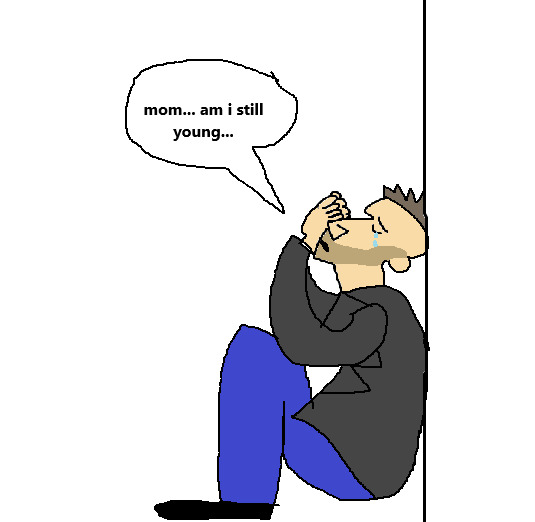
Me
214 notes
·
View notes